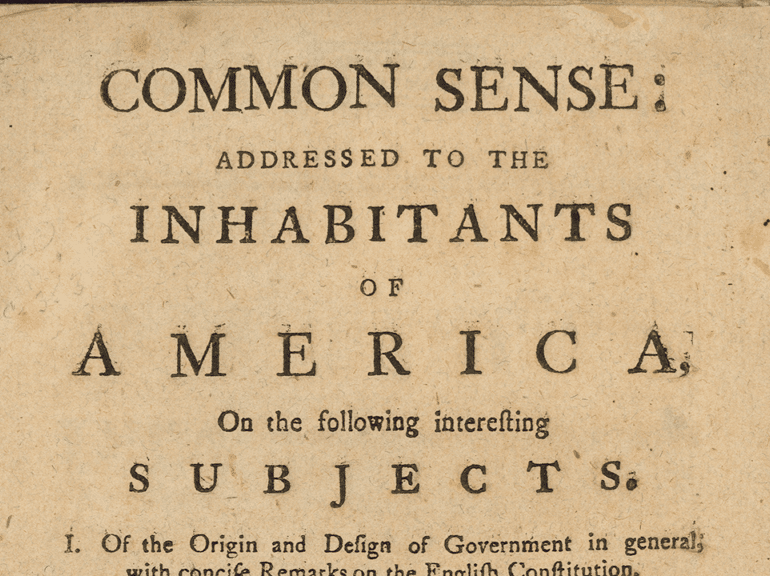
Common Sense: A Scathing Attack on Unlimited, Centralized Power
By: Michael Boldin
January 10, 1776. Today in history, Thomas Paine published the first edition of Common Sense – a 47 page pamphlet that defended and inspired the cause of independence like no other. (check out this podcast on Common Sense here) Leading historians have called it one of the “most brilliant ever written in the English language.”
His first sentence perfectly describes the source of many of the problems we face today:
Some writers have so confounded society with government, as to leave little or no distinction between them; whereas they are not only different, but have different origins.
Think about that.
Every issue, every problem, pretty much everything in existence – rather than leave it to “society” to solve – rather than leave it to the market to handle – millions and millions of people believe that the only solution is to run to government.
The fact that government actually caused most of these problems we face today in the first place – this kind of mentality just keeps making things worse.
Paine took things further in his 2nd paragraph:
“Society in every state is a blessing, but Government, even in its best state, is but a necessary evil; in its worst state an intolerable one: for when we suffer, or are exposed to the same miseries by a Government, which we might expect in a country without Government, our calamity is heightened by reflecting that we furnish the means by which we suffer.” [emphasis added]
Paine then launched a scathing attack on the centralized, unlimited system of power that was the institution of the hereditary monarch, noting that – like the command-and-control centralized powers of modern times – they “have laid the world in blood and ashes.”
He rejected the idea of reconciling with Great Britain, stating that “the present tempting offer of reconciliation is a snare.” Paine believed that reconciliation would lead to “the ruin of the Continent,” citing several reasons for this belief.
First – that under the watch of the largest government in history – the people were prosperous.
Paine pointed out that they were prosperous in spite of that government, not because of it. He wrote that “America would have flourished as much, and probably much more, had no European power taken any notice of her.”
We can certainly say the same of today – government regulations have held things back in serious ways – and while America has indeed been prosperous, it won’t last forever. More importantly, many things likely would have been better without government in the way in the first place.
Second, Paine responded to the claim that the empire was keeping America “safe.”
This kind of view has always been absurd, and fear has always been the foundation of government power. The fact is – we can only be truly safe when we’re free.
Paine also noted that British “protection” was involving them in all kinds of political conflicts that endangered them. And pointed out that free trade was a leading principle of the Revolution:
Our plan is commerce, and that, well attended to, will secure us the peace and friendship of all Europe; because it is the interest of all Europe to have America a free port. Her trade will always be a protection, and her barrenness of gold and silver secure her from invaders.
This was certainly reflected in Pres. Thomas Jefferson’s inaugural years later – when he said it was the policy of these United States to pursue “Peace, commerce and honest friendship with all nations. Entangling alliances is none.”
As long-time TAC blogger and historian Dave Benner noted, Paine made 7 key arguments throughout Common Sense, including these:
- That many traditional rights were naturally bestowed, and preexisted government.
- That legitimate government depends on the consent of the governed, and that governmental establishments were based on contractual relationships between individuals.
- That a free people could withdraw from an illegitimate government, as such a government ceased to possess the ability to demand compliance.
While Paine focused much of his ink on principles – he was also a man with a plan. Months before the Lee Resolution gave us not just the Declaration of Independence, but also what became the Articles of Confederation, Paine recommended in Common Sense:
A declaration “to be published, and despatched to foreign Courts, setting forth the miseries we have endured, and the peaceful methods which we have ineffectually used for redress” and declaring “we had been driven to the necessity of breaking off all connections with Britain”
He said that “such a memorial would produce more good effects to this Continent, than if a ship were freighted with petitions to Britain.”
And years before the Articles of Confederation were finally ratified, Paine recommended a constitutional convention, and even a form of government with a whopping 390 delegates to congress.
Dr. Benjamin Rush – who arranged for the first printing in Philadelphia – said It “burst from the press with an effect which has rarely been produced by types and papers in any age or country.”
Its effect, Benjamin Franklin said, was “prodigious.”
At the end of the day – we’re once-again facing the largest government in the history of the world, as Paine was in his day. So the message remains the same: The road is going to be bumpy, but stay the course!
As Paine put it, “We have it in our power to begin the world over again.”
Please do check out this episode of the Path to Liberty Podcast for a deep dive into this essential history. There, you’ll find both video and audio versions of the show – and if you prefer reading – there’s a bunch of original source documents so you can read and learn more – in context – on your own time.